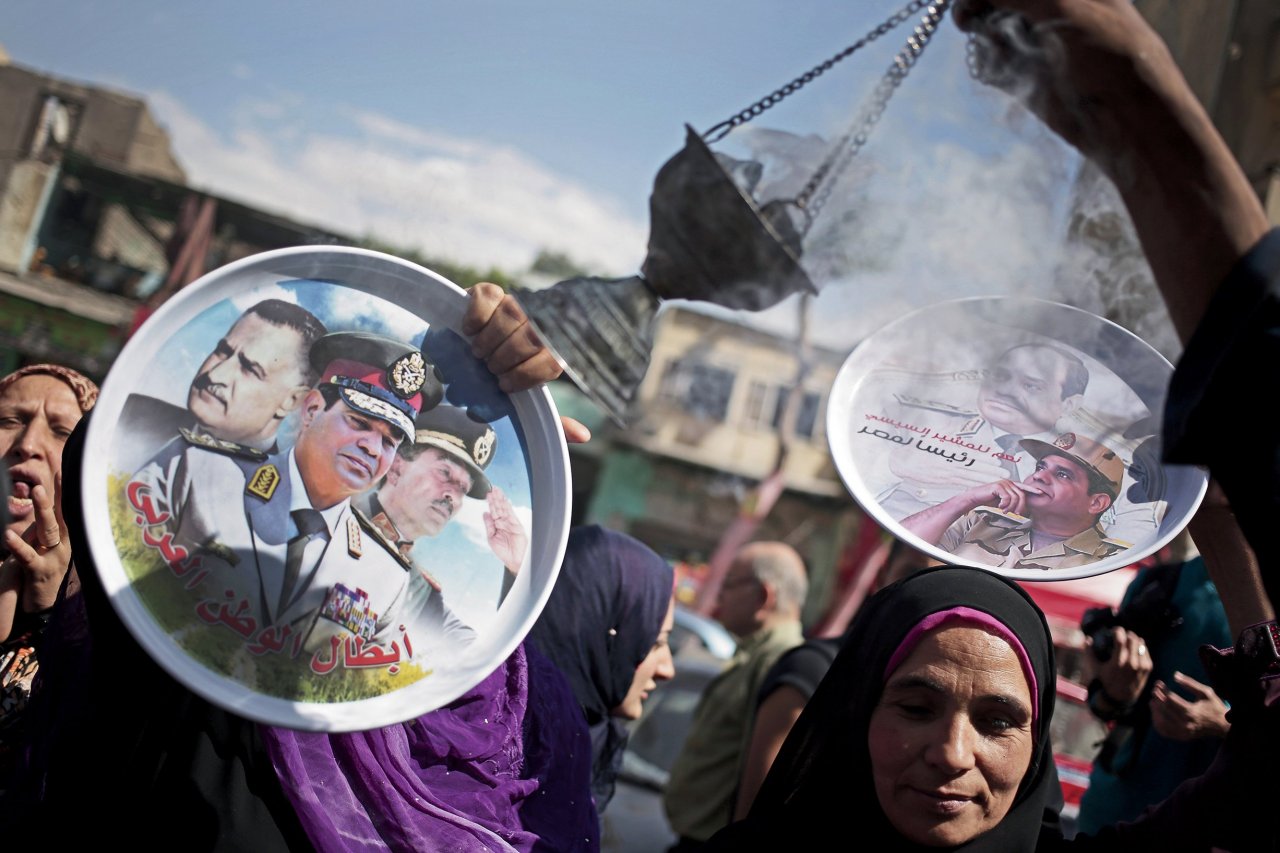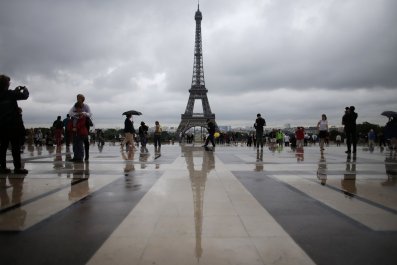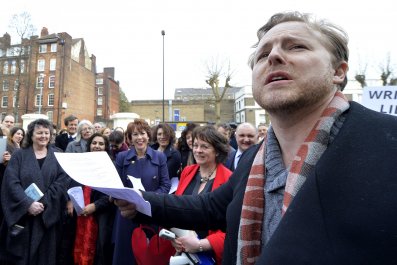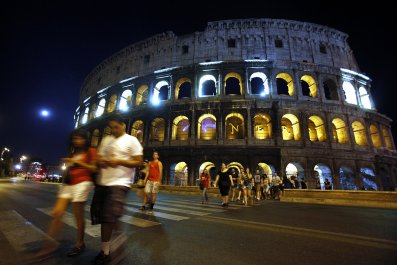Perhaps it's the morning-after effect. Three years after popular uprisings did away with some of the Arab world's most notorious tyrants, wide-eyed expectations for a genuinely democratic Arab Spring are fast vanishing.
True, many Arabs will be exercising their right to vote in elections this year. And Egypt's de-facto leader since last July, former general Abdel-Fattah el-Sissi, has been widely expected to win a sweeping victory at the polls this week.
But while the former military leader did not need to manipulate the results, which accurately reflect the mood of Egyptian voters, it is hard to describe el-Sissi's resounding victory as an exercise in democracy.
The same is true elsewhere in the region. In neighboring Libya, a general who had grown sick of the country's turn to political Islam showed his contempt for the results of democracy by attacking the Parliament building. Parliamentarians responded by announcing new elections on June 25, which will still not make Libya a liberal democracy.
Similarly, Iraq's prime minister, Nouri al-Maliki, finally emerged this month as the victor of the April 30 parliamentary election. Tunisia, too, is planning an election, later this year. In Lebanon, where politics is perennially determined by the tiny country's more powerful neighbors, the hopelessly divided Parliament struggled last week to pick a new Maronite president.
None of the events above bode well for democracy in the region. And all have disappointed Arabs and Westerners alike.
The most cynical example of an election not representing a true democracy—the one that clinches the "election does not democracy bring" argument—is the presidential election in Syria planned for June 3. The poll was announced by President Bashar Assad, even as his country remains deeply divided by a bloody civil war that to date has exacted more than 160,000 Syrian deaths.
Assad is pulling no punches in creating the pomp and circumstance that would suggest a sincere attempt at democracy, including, for the first time in decades, the inclusion of actual opponents on the ballot. But America and its allies are calling the election the sham it is and encouraging a global consensus to declare its predetermined result null and void.
Notwithstanding all the evidence to the contrary from the sputtering Arab Spring, the Western belief that elections and democracy are one and the same thing remains deeply entrenched.
Unlike Assad, who survived despite the Arab uprisings that shook the region, Egypt's old-guard ruler, Hosni Mubarak, was sentenced last week to a three-year jail term after being convicted by a Cairo court of embezzling millions of dollars.
Now, with el-Sissi taking over as Egypt's newly elected leader, observers are warning against too much optimism.
"We have to look at Egypt with the assumption that there are no heroes," says Eric Trager, a fellow at the Washington Institute for Near East Policy. "We're dealing with many flavors of bad."
The 2011 Tahrir Square uprising that unseated Mubarak after 30 years in power was the most hopeful of the Arab Spring revolutions. In the election a year later, a Muslim Brotherhood stalwart, Mohammed Morsi, was elected president. But without much experience in governance, he soon lost the public's trust. Egyptians returned in the thousands to Tahrir Square to protest. Demonstrations led to violent clashes between Morsi's opponents and his supporters. A year after his election, Morsi was forced out of power by el-Sissi.
It was an ironic set of events, as el-Sissi had been handpicked by Morsi to lead the army in the post-Mubarak era. A veteran of Egypt's military, a powerful institution that controls many of the levers of state and commands large parts of the Egyptian economy, el-Sissi managed to convince the Islamists he was an ally. He is widely perceived as a devout Muslim, and many believed early on that while not quite rank and file, he was nevertheless sympathetic to the Muslim Brotherhood's belief in a government strictly based on Sharia law.
The Brotherhood gained some powerful regional allies, including Turkey and Qatar, which has thrown its weight behind Egypt's Islamists and continues to support them through its pan-Arab satellite network, Al-Jazeera.
Morsi also managed to get the ear of many in Washington. In a well-publicized speech in Cairo on June 18, 2013, the then-U.S. ambassador to Egypt, Anne Patterson, tried to dissuade students from protesting against Morsi's rule. "Some say that street action will produce better results than elections," she said. "To be honest, my government and I are deeply skeptical."
Three weeks later, el-Sissi, saying he was heeding the public's wishes, ousted Morsi, who was then arrested. Since then, the general has outlawed the Brotherhood and employed ruthless methods to quash the Islamist movement to ensure it will never return to power.
El-Sissi's fight against the Islamists is beginning to spread to neighboring countries. In Libya, Khalifa Hifter, a former army general who has spent a long period of exile in the United States, led a military assault on Parliament, which he said had become too heavily influenced by the Brotherhood. In response, the parliamentarians gathered last week and, protected by a militia allied to the Islamists, announce a new election.
"Hifter is following Sissi's cue," says an Arab diplomat, adding that Libya and Egypt may start a trend of reversing the Brotherhood's gains in the region.
Washington was "too eager to believe" a set of erroneous assumptions about the Brotherhood, says Trager, the Washington Institute for Near East Policy's Egypt scholar. U.S. officials believed that the Islamists represented a wide swath of the Egyptian population, that the Brotherhood was a force that would turn moderate once in power and become an American ally, and that Morsi would remain in power for a long time.
But when Mubarak was convinced in 2008 by the George W. Bush administration to include the Brotherhood in a parliamentary election, the Brotherhood won no more than 88 seats out of 420. Support for the Brotherhood, which Trager calls an "anti-American fascistic organization," continues to hover at around 20 percent. "The big mistake we made in Egypt was to get too invested in the country's domestic politics," he says. "We shouldn't be betting on any president before they display a commitment for reform."
Instead, Trager says, Washington should leverage its support in the Egyptian military to ensure that Cairo remains pro-American and that U.S. interests are protected: a sustained Egyptian fight against terrorism, a preferred status for American vessels in the Suez Canal and the right for the U.S. military to fly over Egypt's airspace.
But others believe that this is not enough and that the West needs to pick a side—against the Islamists.
"The Egyptian military leadership is engaged in a heroic battle for the separation of mosque and state," says Yigal Carmon, president of the Middle East Media Research Institute. "True," he says, "they also act to preserve their interests as an oligarchy that has ruled Egypt for decades. But as bloody as it is, this is also a battle for values, similar to the one waged by the West centuries ago for separation of religion and state." Democracy, he says, "is not about the election process only. The universal declaration of human rights stands above any election process. This is what students are taught in any Western university. Elections cannot legitimize a party like the Muslim Brotherhood, whose ideology contradicts those values."
The American Civil War that abolished slavery, he says, "was a heroic battle for values that stood above the free will of Southerners, who believed they have a right to continue with slavery." Yet, some in the West continue their support for the Muslim Brotherhood, which, according to Carmon, "amounts to no less than a racist double standard. It says that separation of religion and state is good only for [westerners], but not for the Arabs."



























